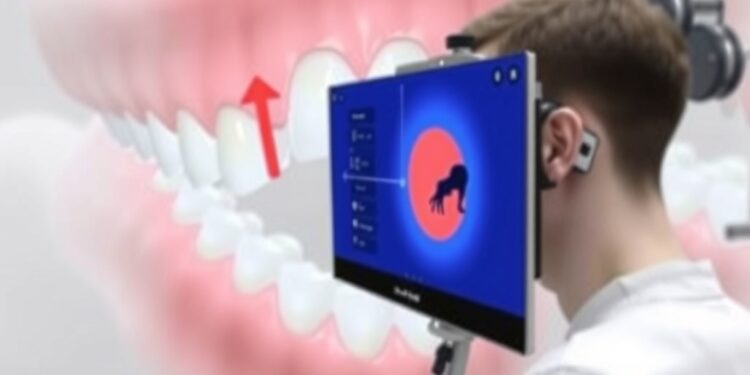The incorporation of virtual reality (VR) haptic simulators in dental education represents a transformative approach, enhancing both the skills and confidence of students engaged in preclinical endodontic training. A recent study published in the International Endodontic Journal highlights how these innovative tools can significantly improve manual dexterity, a critical component of dental practice, while concurrently reducing anxiety among learners. The collaborative research effort, which brought together experts from institutions such as the University of Eastern Finland and several universities in Turkey and Brazil, aims to redefine traditional training methodologies in the field of dentistry.
As dental students transition from theoretical understanding to practical application, they face the formidable challenge of mastering complex procedures. The hands-on experience necessary for developing psychomotor skills often induces stress, which can hinder the learning process and lead to performance anxiety. This study investigates the impact of VR haptic technology as a pre-training tool, ideally poised to mitigate these stressors. By providing a risk-free environment where students can practice repeatedly and receive immediate, standardized feedback, VR simulators bridge the gap between theoretical learning and practical execution.
The methodology employed in the study reflects a rigorous scientific approach. Forty volunteer dental students were randomly assigned into two distinct groups: one experienced VR haptic training prior to working on artificial teeth, while the other group followed the reverse sequence. This design allows for an effective comparison of the two training modalities, effectively isolating the effects of VR technology on skill acquisition and anxiety reduction.
Upon completion of the VR training, evaluations revealed significant differences between the two groups. Students who initially engaged with the VR simulators exhibited higher manual dexterity scores, indicative of increased competency in the technical skills required for endodontic procedures. Furthermore, these students reported a boost in self-confidence regarding their proficiency in accessing cavity preparations, underscoring the value of early exposure to advanced training tools.
The reduction of anxiety levels was another noteworthy finding. The research indicates that engaging with haptic simulators allows students to familiarize themselves with the practical aspects of endodontic procedures without the pressure of immediate, real-world consequences. By cultivating an environment where mistakes can be made and corrected in a virtual setting, students build resilience and reduce stress, which can often impede performance in high-stakes clinical situations.
Interestingly, while both groups experienced a notable decrease in stress levels after practicing with the simulators, the group that started with VR training reported markedly lower anxiety during their preclinical sessions. This suggests that the VR simulator may not only serve as a preparatory tool but could also play a critical role in enhancing the overall educational experience by instilling confidence before direct application on patients.
The findings of this study also reflect an essential shift towards the optimization of dental education curricula. As dental schools worldwide seek innovative ways to equip students with the necessary skills for successful clinical practice, the integration of VR simulators presents an opportunity to improve training outcomes significantly. The rise of technology in education is undeniable, and this research underscores the importance of interdisciplinary collaboration to advance pedagogical strategies.
While the immediate results are promising, the researchers advocate for further investigations into the long-term effects of VR simulator training. Understanding how this technology can be optimally integrated into dental curricula is crucial for sustaining its benefits. Future studies could explore various training scenarios and the effectiveness of different types of haptic feedback on learning outcomes.
In summary, the application of virtual reality haptic simulators within preclinical endodontic education proves to be a compelling advancement. This study not only highlights the positive impacts on skill acquisition and stress reduction but also opens new avenues for integrating cutting-edge technology into medical training. As dental education continues to evolve, the embrace of innovative tools like VR can cultivate a new generation of confident and capable practitioners ready to meet the challenges of the field.
Future research will undoubtedly enrich the body of knowledge surrounding these educational technologies, potentially influencing how dental programs are structured worldwide. The implications for clinical practice are profound, with the potential to enhance patient care through better-prepared dental professionals who are adept at navigating complex procedures with confidence and skill.
By prioritizing the dual objectives of skill acquisition and emotional readiness, dental education can move towards a model that not only focuses on technical capability but also the psychological aspects of training. This holistic approach is essential in fostering a capable workforce in the dental profession, ultimately benefiting both practitioners and patients alike.
The journey of dental students can greatly benefit from the enhanced engagement and reduced stress that VR haptic simulation offers. As this technology continues to develop and become more widespread, it stands as a testament to the power of innovation in education. The future of dental training may well involve a seamless integration of advanced digital technologies, providing students with the tools they need to succeed in one of the most challenging yet rewarding fields in healthcare.
Subject of Research: People
Article Title: A comparison of traditional and virtual reality haptic simulator approaches in preclinical endodontic training: Impacts on skill acquisition, confidence and stress.
News Publication Date: 10-Apr-2025
Web References: http://dx.doi.org/10.1111/iej.14236
References: International Endodontic Journal
Image Credits: Not provided.
Keywords: virtual reality, haptic simulators, dental education, skill acquisition, anxiety reduction, preclinical training, endodontics.




